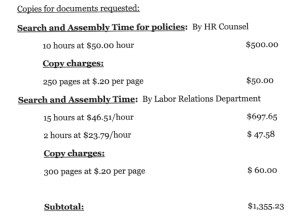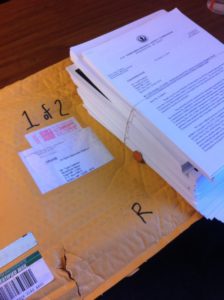In Massachusetts, Asking Agencies to Do Their Jobs Can Be Expensive
 Despite its name, the Freedom of Information Act can set you back quite a bit. To cut departmental costs and prevent abuse, every incarnation of public records law on both national and state levels includes some form of provision which allows for the agency to charge requesters a “nominal” fee for search, processing, and reproduction of responsive documents, to be paid prior to any work being done on the request.
Despite its name, the Freedom of Information Act can set you back quite a bit. To cut departmental costs and prevent abuse, every incarnation of public records law on both national and state levels includes some form of provision which allows for the agency to charge requesters a “nominal” fee for search, processing, and reproduction of responsive documents, to be paid prior to any work being done on the request.
With a few exceptions, such as fee waivers for journalists/documents deemed to be in the public interest (more on that later) and some sort of hourly/page count minimum before fees are incurred, the more-or-less standardized formula for cost estimates goes like this: the hourly rate of the lowest-paid employee of the agency who can conceivably complete the task times the estimated completion length plus the individual reproduction costs times the total number of pages processed PLUS shipping and handling. Add it all up, and it’s easy to see how a hundred page report that can only be properly redacted by a middle-manager of a certain clearance level over the course of a few all-nighters can come with a five-figure price tag.
To be fair, there are a number of options to keep that amount reasonable, such as the aforementioned fee waivers and the increasing number of documents that are made available digitally for significantly reduced reproduction/shipping and handling costs, and several agencies we’ve worked with are supremely generous in their application of that minimum cost/time limit. Some have even gone so far as to waive costs completely if they feel that a requester had to wait longer than necessary for a document to be processed, or if they genuinely believe in the value of getting this information public. There are agencies – especially agencies who have dedicated FOIA officers – who take transparency very seriously, and they’re willing to work with requesters in the name of open, accountable governance.
Very few of those agencies, I am sorry to say, are located in Massachusetts.
Wielded by an agency that’s actively seeking means of preventing disclosure – whether because the documents contain embarrassing or incriminating information, or simply because they feel as if people simply do not need to know these sorts of things – a cost estimate becomes an extremely effective, and completely legal, means of stopping a public records request cold. A list of all emails sent from the police chief’s address that contains racial epithets? We can get those for you, sure – if you’re willing to cough up a few thousand. Nope? Guess it couldn’t have been that important, then.
Consider the case of Brian McCarter, who asked the MBTA for “all policies, procedures, guidelines and requirements to fire an MBTA employee or contractor.” Seems fairly straightforward, doesn’t it? Something that could be found in an HR manual or some managerial discipline guidebook – something that really should be posted online, and not require a public records request to find out in the first place.
The MBTA disagrees. The way they see it, the lowest-paid employee who could find these policies – again, policies that pertain to the basic operation of the MBTA as an organization – works for no less than $50 an hour, and they’ll be searching for on, say … 10 hours? Throw in another $50 for copy charges, and you’ve already broken the $500 mark, and you’re not quite halfway there.
 Fortunately, Labor Relations is up next, with a far more reasonable hourly rate of $46.51 – 15 hours of processing later, however, and you’re looking at $697.65, bringing your total to over a thousand. A couple more charges and copy fees later, and you’re looking at a grand total of $1,355.23.
Fortunately, Labor Relations is up next, with a far more reasonable hourly rate of $46.51 – 15 hours of processing later, however, and you’re looking at $697.65, bringing your total to over a thousand. A couple more charges and copy fees later, and you’re looking at a grand total of $1,355.23.
Whoops, I forgot $20 for postage – $1,375.23. For the answer to the question “what does it take for an MBTA employee to get fired?”
Whatever it is, if it takes over a thousand dollars just to have it named, it should be a doozy.
In an effort to get costs down, Brian attempted to narrow the request to the broadest possible summary, and was told that no such summary was available. It was either all of the docs for the $1,375.23, or nothing for free. Brain’s request – and the answer to his very simple question, remains unfulfilled. And again, all for information that should be publicly available on their website in the first place.
Sadly, it should come as no surprise that this is hardly an isolated incident. In that last few weeks at MuckRock, we’ve seen the city of Cambridge charge $3,648 for emails (talked down from $9,088), the city of Melrose $800 for maps, and Mass State Police ask for $587 for forms. All of which were determined by their respective agencies to be insufficiently in the public interest to merit a waiver. Take a look at those requests yourself and see if you agree.
Transparency is a cornerstone of our democracy, and it is critical to its health and well-being. In Massachusetts, that transparency comes at a price. Until we seriously reform our public records policies, democracy in Mass has a minimum buy-in, and it ain’t cheap.
J. Patrick Brown is the Editor of Muckrock.com, an organization which facilitates public record requests and serves as an independent news source covering government transparency issues nationwide.




